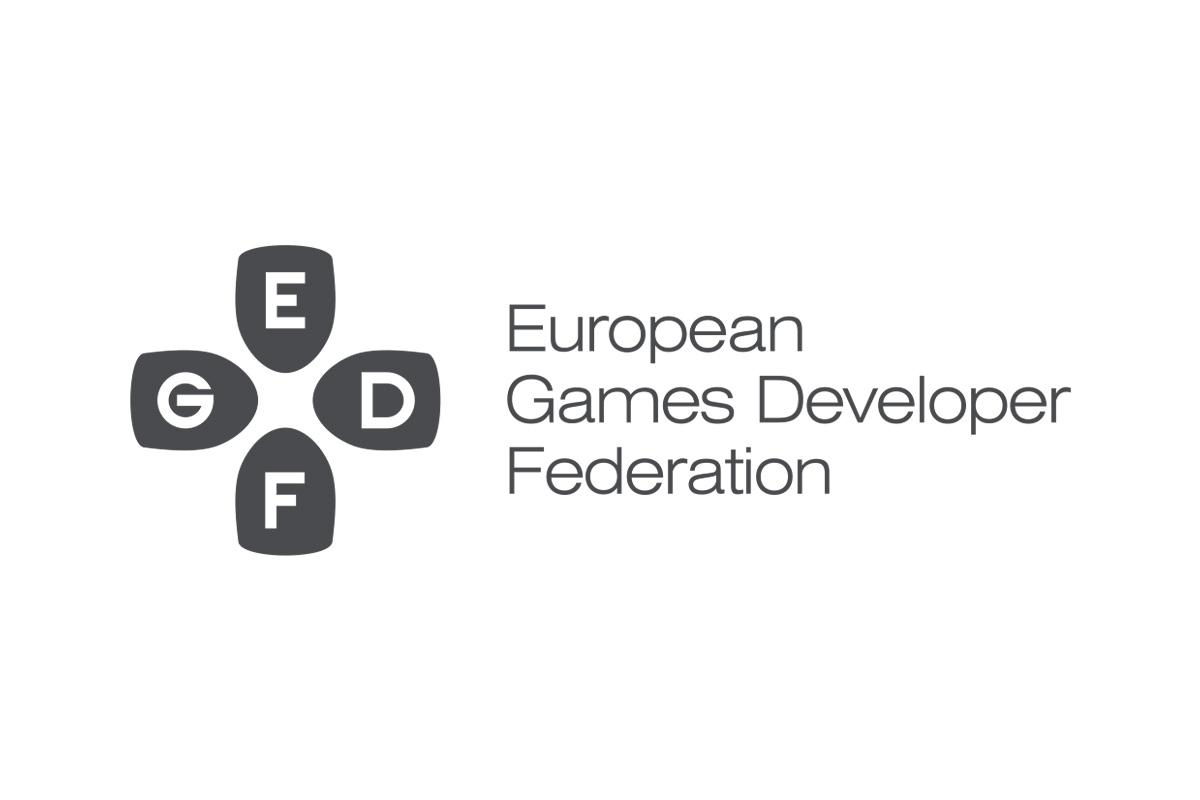
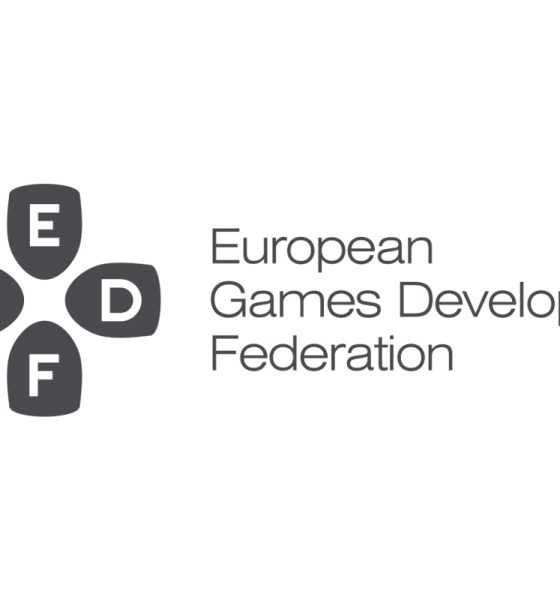
gaming
EGDF: UNITY’S INSTALL FEES ARE A SIGN OF LOOMING GAME ENGINE MARKET FAILURE
Step by step, video game engines are becoming key gatekeepers of European cultural and creative sectors. Currently, Unity dominates game engine markets, Unreal being its primary challenger. These two engines are not just clear market leaders in the game industry but increasingly vital market actors in film, architecture, and industrial design and simulations. In 2022, Unity reported that globally, 230,000 game developers made and operated over 750,000 games using the Unity Engine and the Unity Gaming Services portfolio of products.
Unity’s new fee structure is going to have a drastic impact on the game industry.
Over the years, the Unity game engine has reached close to unofficial industry-standard status in some game markets. Its well-designed tools and services have lowered the market access barriers in the game industry. Furthermore, it has played a crucial role in removing technological barriers to cross-platform game development. Now, Unity has informed the game dev community that it will move from subscription-based fees to subscription and install-based fees, which will significantly increase the game development costs for most game developers relying on their services. EGDF finds it unfortunate that Unity has significantly damaged its reputation as a reliable and predictable business partner with these sudden and drastic changes in its pricing principles.
Bigger game developer studios have the luxury of being able to develop their own game engines. Consequently, market uncertainty and significantly increased service provider risks caused by Unity’s new fee structure will hit, in particular, SME game developers. It will be much harder for them to build reliable business plans, make informed decisions on game engines, and run a profitable business. Many of these studios struggled to access risk funding before Unity’s announcement, and it has only worsened their situation.
Unity’s decision will have a broader impact on the whole game industry ecosystem. Many professional game education institutions have built their curriculum on the Unity game engine. If Unity’s new pricing model starts a mass exodus from Unity’s engine, it will lead to rapid changes in professional game education itself and place many young industry professionals who have built their career plans on mastering Unity’s tools in a very difficult position.
Although Unity’s decision will cause significant challenges for the industry, EGDF kindly reminds that instead of focusing on blaming individual Unity employees for the changes, it is far more productive to focus on taking measures that increase competition in game engine markets.
Unity’s anti-competitive market behaviour must be carefully monitored, and, if required, the European competition authorities must step in.
Unity is an increasingly dominant market player in the game markets. According to Unity’s own estimate, in general, 63% of all game developers use its game engine. The share can be even higher in some submarkets. Unity estimates that 70% of top mobile games are powered by its engine. Unsurprisingly, Unity’s game engine is now a de facto standard in mobile game markets to the extent that whole formal professional game education degree programmes have been built on training its use. However, Unity’s market dominance is not just based on the quality of its game engine. It is also an outcome of aggressive competition practices and systematic and methodological work of making game developers dependent on Unity services.
How Unity bundes different services together potentially distorts competition in game middleware markets. Over the years, Unity has, step by step, bundled its game engine more and more together with other game development tools under the Unity Gaming Services portfolio. Unity is not just a game engine; it is also a player sign-in and authentication service, a game version control tool, a player engagement service, a game analytics service, a game chat service, a crash reporting tool, a game ad network, game ad mediation tool, an user acquisition service and in-game store building tool. This creates a significant vendor lock risk for game developers using Unity services. It also makes it difficult for many game middleware developers to compete against Unity and, all in all, significantly strengthened Unity’s game engine’s market position compared to its rivals.
Now, Unity is strategically using install fees to deepen the lock-in effect by creating a solid financial incentive to bundle other Unity services even closer to its game engine: “ Qualifying customers may be eligible for credits toward the Unity Runtime Fee based on the adoption of Unity services beyond the Editor, such as Unity Gaming Services or Unity LevelPlay mediation for mobile ad-supported games. This program enables deeper partnership with Unity to succeed across the entire game lifecycle.” This will, of course, drastically impact Unity’s direct competitors.
Unity’s install fees are an excellent example of Unity’s potentially anti-competitive market behaviour. It is clear that if Unity’s pricing model had, in the past, been similar to the now-introduced model, it would likely never have achieved the level of dominance it enjoys today, as more developers would have chosen another alternative in the beginning.
The fact that Unity’s new install fees are only targeted at video games and do not apply to other industries logically leads to a question: Is Unity setting prices below cost level at different market segments, or is Unity charging excessive prices in game markets? Furthermore, does the fact that Unity is now introducing an install fee on top of the licensing fee mean that licensing fees have before been below cost level? Or does the introduction of install fees on top of the licensing fees of their game engine allow them to provide other, lock-in generating, services below cost level?
In the end, Unity has built its dominant position in game markets for years and systematically made game developers more dependent on it. It is a good question if Unity has now crossed the line of abusing its market dominance on weaker trading parties that deeply depend on its services. Game productions can take years, and game developers cannot change their game engine at the last minute, so they are forced to accept all changes in contract terms, no matter how exploitative they are. Unity must know that if they had given more notice, many more developers might have had a realistic chance of abandoning Unity altogether by the time the new pricing came into play.
The new install fees will limit game developers’ freedom to conduct business as it pushes them to implement Unity ad-based business models even in games that otherwise would not have ad-based monetisation. Furthermore, this will create a competitive disadvantage for those game distribution platforms that do not use ad-based monetisation at all (e.g. subscription services and pay-per-download games), as Unity is de facto forcing them to increase their consumer fees compared to channels that allow the use of Unity’s ad-based monetisation tools.
The new install fees will likely lead to less choice for consumers. Install fees will allow Unity to extract value from games that generate a lot of installs through, e.g. virality, but do not necessarily generate money. Install fees will lead to markets where game developers want to limit the downloads and try to avoid installs from the wrong players. This can potentially kill part of the game market. For example, indie developers that have an unfortunate mix of being a success on the number of installs but that are struggling to generate revenue, or hyper-casual game studios based on combining a huge install base with minuscule revenue generated per game.
In the long run, the EU needs to update its regulatory framework to answer the challenges caused by dominant game engines.
Unity’s install fees demonstrate why the EU needs a new regulatory framework for unfair, non-negotiable B2B contract terms. Contract terms Unity has with game developers are non-negotiable. With the new non-negotiable install fee, European game developers have to either withdraw their games from markets, increase consumer prices or renegotiate their contracts with third parties. For example, if a game memory institution makes games available for download on their website, a game developer studio must now ask for a fee for it or ban making European digital cultural heritage available to European citizens. The three-month time frame Unity is providing for all this is not enough.
The Commissions should introduce a specific regulation for non-negotiable B2B contract terms. The regulation should provide sufficient time (e.g. in a minimum, six months) for markets to react to significant changes in non-negotiable terms and conditions that a service provider has communicated to their business users in a plain, clear and understandable manner (e.g. now it is unclear how Unity counts the installs). Furthermore, the Commission should bring much-needed market certainty by banning retroactive pricing and contract changes.
The Commission should include game engines in DMA. While reviewing the recently adopted Digital Markets Act (DMA), the Commission should consider lowering the B2B user thresholds and adding gatekeeper game engines under its scope. This would, for example, ensure that Unity cannot use data it collects through its game engine to gain an unfair competitive advantage for its other services like advertisement services.
The Commission should increase its R&D support for the European game industry. The fact that there is no major competitor for Unity Engine that does not require constant back-end server connection is a market failure in itself. The Unity Game engine is not fully scalable because Unity has built its engine in a way that it calls home every time it is installed to report instals for Unity. Consequently, the Commission should strengthen its efforts to support the emergence of new European game technology and business service providers. In particular, the Commission should increase its support for privacy-friendly open-source alternatives for game engines, like for example Godot or Defold or similar, that do not require constant back-end server connection and thus have no need for scalable revenue-based fees or install fees.
Central Europe
Number of companies and employees in German games industry falls for first time in years
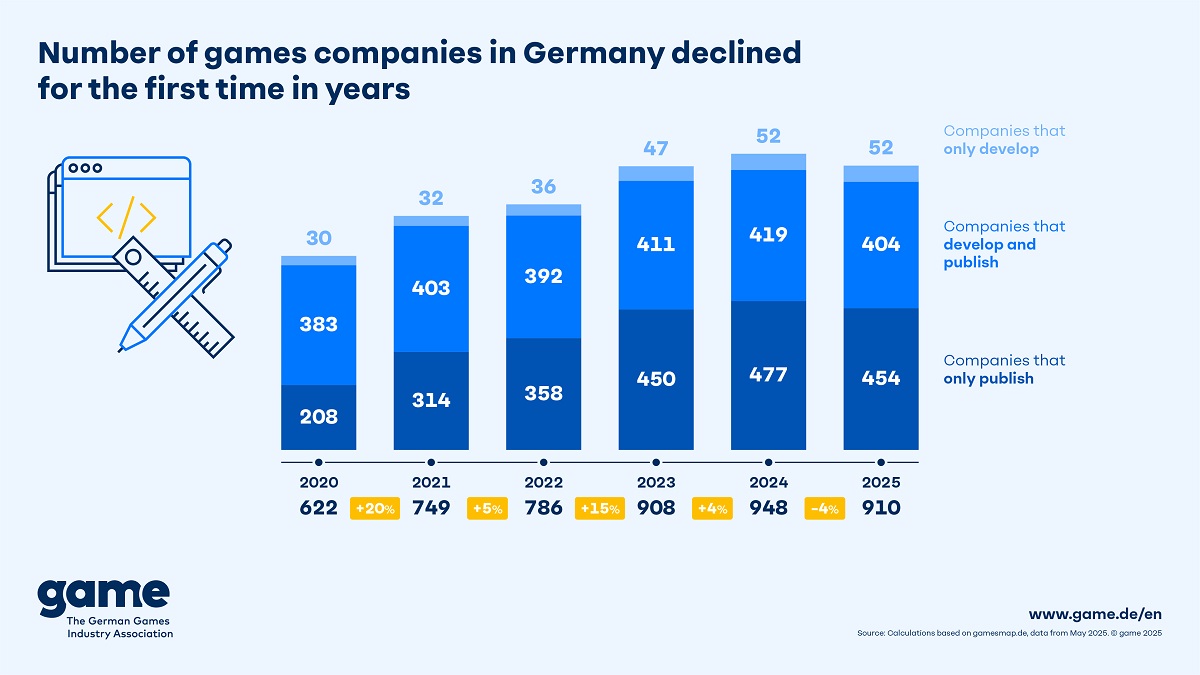
After years of growth, the number of companies and employees in the German games industry declined in 2025. This was announced today by game – The German Games Industry Association on the basis of data from gamesmap.de in cooperation with Goldmedia. According to the data, the number of companies in Germany that develop and/or publish games has dropped by 4 per cent within the past year, to 910. The boom in start-ups in the games sector, which was set in motion by the introduction of the German Federal Games Funding Programme in 2020, has now completely subsided. Last year’s figures already indicated a clear slowdown. This decline was due in particular to the consolidation of the global games market and the unreliable availability of games funding to date in Germany.
Three times since 2020, there have been months-long suspensions placed on funding applications. Despite the newly registered drop, the number of companies has risen by 46 per cent overall since the initial start of the games funding programme in 2020. Of the 910 present companies, 454 work exclusively in game development and 52 exclusively as publishers. The remaining 404 companies are active in both the development and publishing of games.
‘Last year was another very difficult one for the German games industry,’ says Felix Falk, Managing Director of game. ‘Germany’s international competitiveness was further decreased by the ongoing flip-flopping of the games funding policy, which ran right into the consolidation wave that swept the global games sector. Fortunately, the new federal government has already taken the necessary steps to level the playing field for companies in this country. The future funding budget is to be increased and thus adjusted to actual needs, and applications can be submitted from August onwards. These are crucial growth impulses that are urgently needed. The additional funds will not only give companies more planning security, but also time to implement additional tax breaks for games, as set out in the coalition agreement between the CDU, CSU and SPD. The improved conditions will finally give games companies a boost, which will hopefully soon be reflected in more start-ups and the creation of new jobs.’
The number of employees at games companies in Germany has also declined over the last year. Whereas game developers and publishers employed 12,408 workers in 2024, the current figure stands at just 12,134 – a drop of 2 per cent. As with the number of companies, the employee numbers had previously shown strong growth since the introduction of the games funding programme at the federal level: a rise of 23 per cent from 2020 to 2024. The recent decline indicates that the current conditions for the games industry, which offer limited scope for planning due to the repeated funding application stoppages and significant current funding restrictions, are having an impact on the job market. A year ago, there were still more companies with ongoing projects that were internationally competitive thanks to funding at levels comparable to those in other countries – financing that had stabilised Germany’s game sector, despite the global consolidation wave and a lack of funding certainty for the industry here. The game industry secures a total of over 30,000 jobs in Germany. In addition to jobs in development and publishing, these include, for example, skilled professionals in educational institutions, the media and the public and commercial sectors.
About the data
The data is drawn from a survey carried out by Goldmedia on the basis of entries on gamesmap.de. It was conducted on behalf of game – The German Games Industry Association for the period ending on 12 May 2025.
The post Number of companies and employees in German games industry falls for first time in years appeared first on European Gaming Industry News.
Asia
METABORA Partners with LINE NEXT
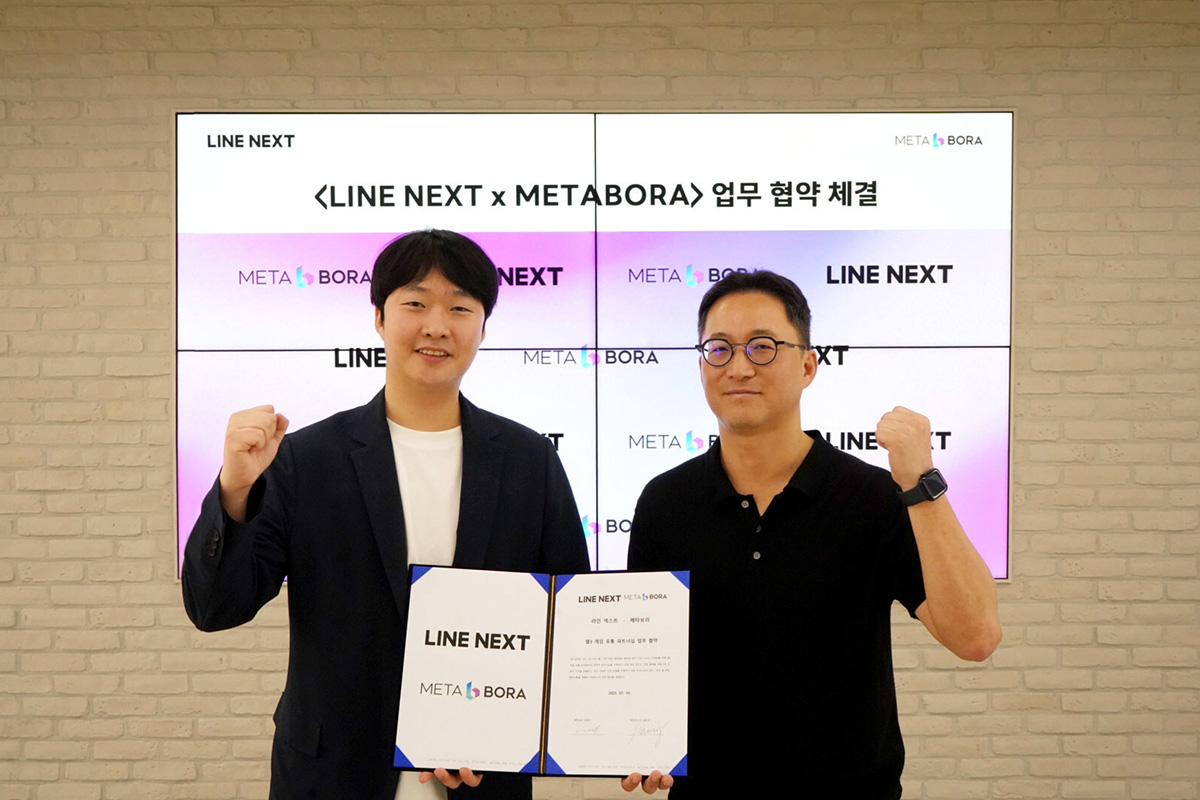
METABORA, a global casual game developer and blockchain project operator, has announced a strategic partnership with LINE NEXT Inc. Through this partnership, METABORA will distribute Web3 games via the LINE Messenger–based Dapp Portal, expanding its reach in the Web3 gaming space.
The Dapp Portal is a platform built on the KAIA ecosystem that offers Mini Dapps (decentralised applications) directly within the LINE Messenger app. Users can enjoy a variety of Mini Dapps—ranging from games to social features—without needing to install separate applications. Since its launch in January this year, the platform has garnered significant attention, surpassing 100 million cumulative users.
Through this new partnership, METABORA and LINE NEXT will work closely to accelerate the growth of the Mini Dapp’s gaming ecosystem. Leveraging its network of development partners and global experience in game development and publishing, METABORA will supply Web3 games to the Dapp Portal. LINE NEXT will expand accessibility to Web3 games and support marketing of these games through its platform.
As part of the collaboration, METABORA will also expand the utility of its BORA token within the LINE Messenger–based Mini Dapp ecosystem. The company plans to implement a payment infrastructure that enables users to purchase in-game items currently planned for upcoming titles to be released under the BORA brand. Additionally, METABORA will apply Gas Abstraction technology, allowing users to make in-app purchases with BORA without needing KAIA tokens to cover gas fees. This feature is expected to be fully implemented in the second half of the year.
By expanding the utility of the BORA token, METABORA aims to elevate its value beyond the confines of the BORA Chain, laying the groundwork for broader integration across the Web3 ecosystem.
In addition, METABORA and LINE NEXT plan to continue their collaboration by researching and developing infrastructure to support the use of stable coins such as USDT, further enhancing the Web3 gaming experience within the LINE ecosystem centered on the Dapp Portal.
Lim Youngjun, Co-CEO of METABORA, said: “We’re pleased to partner with LINE NEXT, a company making remarkable strides in the global Web3 gaming market with its vast user base. Through our strong network of development partners, we will carefully select and bring high-quality games to the Dapp Portal, working together to create a leading example of Web3 gaming reaching a mainstream audience.”
Kim Woosuk, CSO at LINE NEXT, said: “Through this partnership with METABORA, we look forward to creating a major success case for Mini Dapp. Moving forward, we will continue working closely together across multiple fronts, including enabling USDT stablecoin support to improve game onboarding and the overall user payment environment.”
The post METABORA Partners with LINE NEXT appeared first on European Gaming Industry News.
gaming
Limited Run Games Achieves the Impossible: Announcing Pre-Orders for Standard and Collector Editions of DOOM(™) on the Super Nintendo™ Entertainment System!
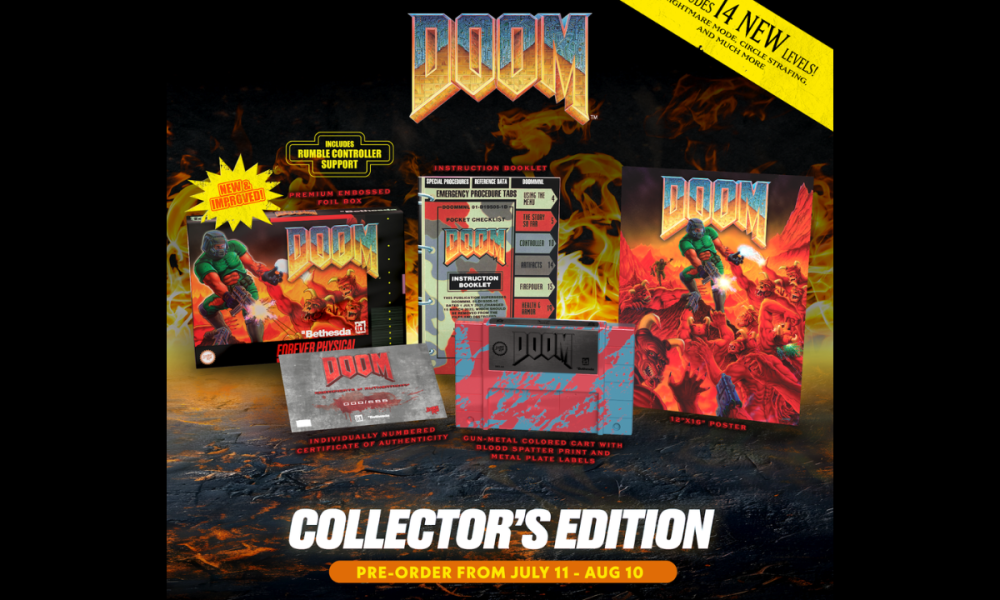
Limited Run Games, a premium publisher of physical and digital games, announced today the opening of pre-orders for the long-awaited DOOM, arriving on physical cartridge for use with the Super Nintendo Entertainment System!
Entertainment System!
To celebrate this remarkable release, Limited Run Games are also pleased to announce the opening of pre-orders for the SNES compatible Rumble Tech Controller, bringing vibration technology to SNES games for the very first time!
compatible Rumble Tech Controller, bringing vibration technology to SNES games for the very first time!
In a move that only Limited Run Games could have the audacity to pull off, the impossible became real, partnering with Bethesda Softworks to introduce a remarkable special edition of the classic game, some 30 years after the original DOOM first debuted for the SNES .
.
Headed up by legendary programming wizard Randal Linden, who first worked on DOOM for the SNES in 1995, this enhanced version is no mere re-release of the original. Determined to do justice to the iconic shooter which birthed the modern FPS, this new version expands upon the original with a host of new features, ‘impossible’ graphical tricks and engineering dark magic that will leave 16-bit gamers breathless with excitement!
Created utilizing an all-new, custom-made board, designed specifically for this project, Limited Run Games’ version of DOOM for the Super Nintendo, greatly enhances performance which SNES enthusiasts will scarcely believe possible. Limited Run Games have fully restored the entire DOOM experience, featuring all four episodes of DOOM including ‘Thy Flesh Consumed,’ which was originally introduced in 1995 as part of the updated PC release ‘The Ultimate DOOM’. There’s much more than that though, also included are levels that were missing from the original release due to technical limitations, with five new levels implemented including E1M6, E2M2, E2M5, E2M7 and E3M5, delivering a complete DOOM experience for the humble SNES for the very first time.
Limited Run Games ain’t done yet: In addition to the improved performance and restored levels, DOOM now proudly includes support for circle-strafe, monster re-spawning on Nightmare difficulty, an appearance by the dreaded translucent Spectre monster, full-motion video logos and so much more.
A release this special demands a new controller to take advantage of the enhanced features, and here, Limited Run Games have gone the extra mile. Pre-orders open on 7/11/25 for the SNES compatible Rumble Tech Controller (sold separately), an open-source gamepad which will feel familiar to fans of the original SNES controller but now comes complete with powerful dual vibration support! Naturally, this new version of DOOM includes rumble support, but Limited Run Games are showing love to the community, offering open-source support to developers and modders, allowing third parties to update their games to include rumble support or code new titles utilizing the feature!
Back to the game and players will take note of a new music player which has been included to relive the superb score of the game, high quality title and score-card screens added, and a Level Selection menu alongside a Level Code system, which allow gamers to tackle DOOM in the method of their choosing.
It’s DOOM that shouldn’t be possible, fusing old-school technology with state-of-the-art enhancements to deliver a thrilling new take on the iconic game.
Two versions of DOOM for the Super Nintendo Entertainment System will be available, with both open for pre-order on 7/11/25:
Doom Standard Edition – Super Nintendo Entertainment System – $99.99 MSRP
- Metallic Gunmetal Colored SNES Cart
- Instruction Booklet
- 12” x 16” Poster
- Retro SNES Box
Doom Collector’s Edition – Super Nintendo Entertainment System- $174.99 MSRP
- Exclusive Collector’s Edition SNES cartridge – Metallic-ink Gunmetal color with Blood Splatter print and Metal Plate Label
- Premium Embossed Foil Box
- Instruction Booklet
- 12” x 16” Poster
- Individually Numbered Certificate of Authenticity
- Limited to 666 copies
Pre-orders for Doom on the Super Nintendo Entertainment System go live on 7/11/25, but be quick, pre-orders close on 8/10/25. Visit Limited Run Games for more information.
The Limited Run Games SNES compatible Rumble Tech Controller will retail for an MSRP of $34.99 and will be open for pre-order on 7/11/25.
The post Limited Run Games Achieves the Impossible: Announcing Pre-Orders for Standard and Collector Editions of DOOM(™) on the Super Nintendo™ Entertainment System! appeared first on Gaming and Gambling Industry in the Americas.
-

 gaming3 years ago
gaming3 years agoODIN by 4Players: Immersive, state-of-the-art in-game audio launches into the next generation of gaming
-
EEG iGaming Directory8 years ago
iSoftBet continues to grow with new release Forest Mania
-
News7 years ago
Softbroke collaborates with Asia Live Tech for the expansion of the service line in the igaming market
-
News6 years ago
Super Bowl LIII: NFL Fans Can Bet on the #1 Sportsbook Review Site Betting-Super-Bowl.com, Providing Free Unbiased and Trusted News, Picks and Predictions
-
iGaming Industry8 years ago
Rick Meitzler appointed to the Indian Gaming Magazine Advisory Board for 2018
-
News6 years ago
REVEALED: Top eSports players set to earn $3.2 million in 2019
-
iGaming Industry8 years ago
French Senator raises Loot Boxes to France’s Gambling Regulator
-
News7 years ago
Exclusive Interview with Miklos Handa (Founder of the email marketing solutions, “MailMike.net”), speaker at Vienna International Gaming Expo 2018



















